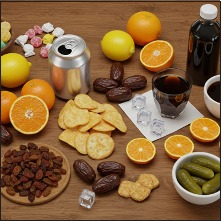By Aulah Najjuuka
When we think about keeping our teeth healthy, we often focus on brushing, flossing, and the occasional visit to the dentist. But what many people overlook is the powerful role diet plays in oral health. What we eat and drink every day can either protect our teeth or slowly damage them—sometimes without us even realising.
In Uganda, where sugary snacks, fizzy drinks, and starchy foods are increasingly part of everyday life, dental problems such as tooth decay and gum disease are becoming more common. According to dental health expert Dr. Sam Kaaya of Lark Dental Services, understanding the link between diet and oral health is essential.
Foods that harm your teeth
Let’s begin with the culprits. While sugary foods are widely known to be harmful, many people don’t realise how some common foods quietly cause tooth decay.
Sugary foods and drinks: Sweets, cakes, biscuits, and soda are some of the biggest offenders. These foods provide fuel for harmful bacteria in the mouth. When these bacteria feed on sugar, they produce acids that erode tooth enamel—the protective outer layer of our teeth. Over time, this leads to cavities.
In Uganda’s urban centres like Kampala and Mukono, students and workers alike often rely on sugary soft drinks and snacks for quick energy. But this habit, if not controlled, has long-term consequences on oral health.
Refined carbohydrates: You may be surprised to learn that foods like bread, crisps, and white rice can also harm your teeth. These refined starches break down into sugars in the mouth, feeding bacteria just like sweets do. They also tend to stick to the teeth, making it easier for plaque to form.
Acidic foods and drinks: Citrus fruits, energy drinks, and some fruit juices are high in acid. Frequent consumption can erode enamel, even without the presence of sugar. Drinking orange juice every morning might seem healthy, but sipping it slowly over time can wear down your teeth.
Sticky foods: Foods that cling to your teeth—like dried fruits or dates—can be especially damaging. They tend to stay on the tooth surface longer, giving bacteria more time to cause decay.
Foods that help protect your teeth
Now for the good news: some foods can actively protect and strengthen your teeth. A tooth-friendly diet can make a huge difference, especially for young people still forming lifelong habits.
Dairy products: Milk, cheese, and yoghurt are excellent for oral health. They contain calcium and phosphates that help rebuild enamel and keep teeth strong. Cheese also helps balance the pH in your mouth, reducing acid levels after meals.
Crunchy fruits and vegetables: Apples, carrots, and cucumbers are like natural toothbrushes. Their fibrous texture helps scrub away plaque, and they stimulate saliva flow, which neutralises acids and washes away food particles.
Leafy greens: Vegetables like nakati and dodo are rich in calcium and folic acid, which strengthen teeth and support gum health. They’re also low in sugar, making them perfect for regular meals.
Water: Drinking plenty of water is one of the simplest ways to protect your teeth. It helps rinse away food debris, keeps your mouth hydrated, and promotes saliva production, which is crucial for neutralising harmful acids.
Green tea: In moderation, green tea can offer antibacterial benefits for the mouth. It contains compounds that may help fight plaque-forming bacteria and reduce inflammation.
Simple dietary habits for better oral health
You don’t need to give up your favourite foods altogether, but being mindful of your choices—and how you consume them—can go a long way in preserving your smile. Some of the ways you can do this include; limiting snacks between meals; drinking water after meals especially after eating sugary or acidic foods; having a quick rinse with water which helps reduce damage; and chewing sugar-free gum which stimulates saliva production and can help cleanse the mouth after eating.
It is also important to brush twice a day, using fluoride toothpaste and a soft-bristled brush, and brushing for at least two minutes.
Remember that a healthy diet is not just good for your body—it’s the best foundation for healthy teeth, too.


